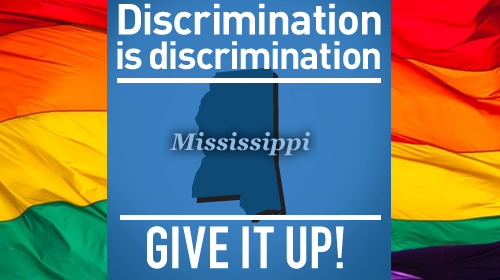
Last night, the Mississippi legislature passed a law that could open the door to allow individuals and businesses to discriminate in the name of religion -- despite opposition from , , , and in the wake of a nationwide outcry over similar legislation in Arizona. People across the country have made it clear that they do not support discrimination--no matter how it's labeled.
The sustained pressure had a real positive impact: the law passed in Mississippi, while not ideal, was a significant improvement upon Arizona's notorious SB 1062. Recall that employees to discriminate even in defiance of an employer's policies. The Arizona law would have allowed private individuals and businesses to sue other private parties using religious freedom as a cause of action, and would have put private businesses in the curious and perhaps untenable position of defending the government's interest in enforcing its policies.
The of Mississippi's law was even broader than Arizona's. But the is narrower. It allows lawsuits only against the government, and requires the government to show a very good reason for policies that substantially burden the free exercise of religion. Some seemingly neutral governmental policies, like dress codes, could have a significant impact on religious believers. (Take, for instance, a , where an Orthodox Christian man was held in contempt because he refused to remove his religiously required hat in a courtroom.) When they do, the government will have to justify the burden.
However, as we also have seen, sometimes people try to use religion to harm others and discriminate. And disappointingly, the Mississippi legislature rejected language that would have explicitly prohibited religion from being used to excuse discrimination. Now it will be up to Mississippi's courts to recognize the importance of enforcing protections from discrimination, and we are hopeful that they will interpret this law correctly.
Thankfully, politicians in other states did listen. In Arizona, that her own staff helped draft after facing overwhelming public opposition from major corporations, including and ; in ; and Arizona voters, a opposed the bill.
Similar legislation failed in Georgia, where , , and other influential corporations announced their opposition; a bill in Idaho was pulled from the House after flooded the capitol in protest; the sponsors of a bill in Ohio withdrew the legislation, that support for the bill would be "in favor of discrimination"; and, following public testimony and a long floor debate, a bill was by a majority in both the Senate and the House.
These victories should be celebrated, but, as Mississippi makes clear, the fight is not over. Bills are still being considered in Missouri and Oklahoma. But we have seen that when we speak up -- politicians listen. Let's make our voices heard and defeat these dangerous bills before they become law.
Learn more about religion and belief and other civil liberty issues: Sign up for breaking news alerts, , and .

